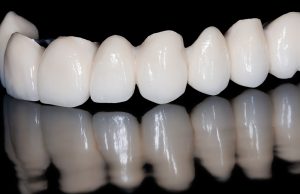
A dental bridge is a false tooth or teeth, known as a pontic, which is fused between two porcelain crowns to fill in the area left by a missing tooth or teeth. The two crowns holding it in place that are attached onto your teeth on each side of the false tooth. This is known as a fixed bridge. This procedure is used to replace one or more missing teeth. Fixed bridges cannot be taken out of your mouth as you might do with removable partial dentures.
Advantages of dental bridges
- restore your smile
- restore your ability to properly chew and speak
- maintain the shape of your face
- distribute the forces in your bite properly by replacing missing teeth
- prevent remaining teeth from drifting out of position
Disadvantages of dental bridges
- teeth become mildly sensitive to extreme temperatures for a few weeks
- they require healthy tooth tissue from neighboring teeth to be prepared
- your teeth and gums are vulnerable to infection as a result of accumulation of bacteria due to the food acids (if proper hygiene is not maintained)
Types of dental bridges
- Traditional bridges involve creating a crown for the tooth or implant on either side of the missing tooth, with a pontic in between. Traditional bridges are the most common type of bridge and are made of either porcelain fused to metal or ceramics.
- Cantilever bridges are used when there are adjacent teeth on only one side of the missing tooth or teeth.
- Maryland bonded bridges (also called a resin-bonded bridge or a Maryland bridge) are made of plastic teeth and gums supported by a metal framework. Metal wings on each side of the bridge are bonded to your existing teeth.
Bridges may be made of
- Porcelain
- Porcelain bonded to precious metal
- All-metal dental bridges (gold)
Dental bridges can last 10-15 years, provided that you maintain good dental hygiene and eating habits.
Alternatives to a dental bridge
The only alternatives to a dental bridge are dentures or implants. Single tooth dentures can be uncomfortable and awkward where only one or two teeth are involved, and are not generally recommended for this purpose. Dental implants involve having a false tooth fixed to a titanium post that has been screwed into the jawbone. This can be an expensive and invasive process and is only suitable to people who are medically fit, with healthy gums and thick jawbones.
For more information or to schedule an appointment, give us a call today at (415) 567-2900.
